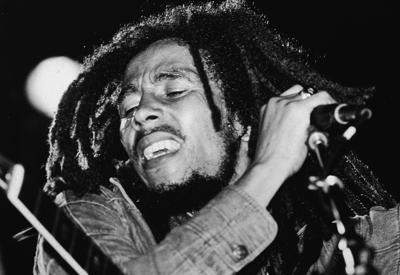There’s a new movie about Bob Marley’s most commercially successful years, and it is called “Bob Marley: One Love.” Director Reinaldo Marcus Green and his three screenplay-writing collaborators deserve considerable credit for getting a coherent movie out of their material.
But the thing is, Marley’s life wasn’t a story. Actual events almost never take the form of a single narrative. This is why movies “based on a true story” are almost all disappointing. Marley was talented and accomplished. But his life was too complicated to make a good 90-minute narrative.
Those who want to see the movie and judge its re-telling of the events may not want to go on reading. If you’ve managed to miss learning about Marley’s life in the 1970s and 1980s, reading this is going to spoil your enjoyment of discovery of the events in the film.
Though it frequently slips into flash-backs, usually thankfully brief ones, the film shows what happened to Marley from the time he was shot in 1976. By then he was already a popular Jamaican pop musician with an international following and a contract with Chris Blackwell’s Island Records.
He was preparing to play at a free concert in Kingstown that was intended to calm political feeling in the island nation. Violence had become common. Three men sneaked into Marley’s walled compound and shot his wife, his manager, and Marley himself, though all of them survived and Marley and Rita performed at the concert two days later.
Marley and the current Wailers (Bunny Wailer and Peter Tosh had already left the band) then moved to London and began writing and recording their signature “reggae” pop music, the successor to mento, ska, and rock-steady. Two years later the band began to perform again, and the film gives us re-enactments of some of their performances in Western Europe.
Included with this material is a fight between Marley and Rita, a more violent fight between Marley and his manager (who seemed to have been taking financial bribes or tips), and references to the singer’s injured toe. When he saw a doctor about this last, he discovered that he had the relatively rare acral lentiginous melanoma, a skin cancer which shortly killed him.
A couple of other complications figure in the film. Marley became a Rastafarian while in Jamaica. This is a religion with political elements, Marcus Garvey influenced, and associated with dread-locks (a hairstyle) and marijuana use.
Then the film shows us evidence of Marley’s devotion to physical exercise and to soccer, and it doesn’t ignore Marley’s paternity of at least seven children (one of them the musician Ziggy Marley) who had different mothers.

Kingsley Ben-Adir stars in “Bob Marley: One Love,” a biopic based on the Jamaican musician’s life.
Generally speaking, the film gives us a happy, active, forgiving Marley, and it is helped in this by the casting of Englishman Kingsley Ben-Adir to play its title character. Ben-Adir makes Marley likeable if sometimes distracted by memories of his past — particularly of his own relationship with his parents — and his recurring dream of recognition by a father.
The film’s dialogue is delivered in a seemingly realistic Jamaican patois which may have some viewers wishing for sub-titles. That detail seems to fit with the cinematography’s tendency to be just the least little bit fuzzy.
“Bob Marley: One Love” does entertain most of the time, and Green and Ben-Adir have given us images of some interesting events in Marley’s later life. He went back to Jamaica again to perform at another concert intended to take some of the political tension out of the national air. So the singer’s two political appearances frame most of the movie’s otherwise disparate events.

















